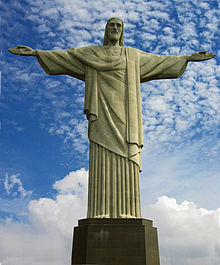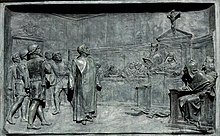Morris West
Appearance

Morris Langlo West (26 April 1916 – 9 October 1999) was an Australian novelist and playwright.
Quotes
[edit]
The Shoes of the Fisherman (1963)
[edit]- It costs so much to be a full human being that there are very few who have the enlightenment, or the courage, to pay the price…. One has to abandon altogether the search for security, and reach out to the risk of living with both arms. One has to embrace the world like a lover, and yet demand no easy return of love. One has to accept pain as a condition of existence. One has to court doubt and darkness as the cost of knowing. One needs a will stubborn in conflict, but apt always to the total acceptance of every consequence of living and dying.
The Heretic (1968)
[edit]
- A play in three acts on the arrest, imprisonment, and trials of Giordano Bruno who was burned at the stake in 1600.

- There are a few of us — madmen all! — who are in love with knowing, who would sell the last shirt from our backs for one small truth, one tiny star-fire to light up the murk and mystery of what we call our life… We may go blind before we see it, that's the haunting —
- No man — prince, peasant, pope, — has all the light, who says else is a mountebank. I claim no private lien on truth, only a liberty to seek it, prove it in debate, and to be wrong a thousand times to reach a single rightness. It is that liberty they fear. They want us to be driven to God like sheep, not running to him like lovers, shouting joy!"
- Ever since the Greeks, we have been drunk with language! We have made a cage with words and shoved our God inside!
- If God be God and man a creature made in image of the divine intelligence, his noblest function is the search for truth.
- O Mother of Christ, who saw what men could do to one who heard an alien music! Bend to me, be tender. I am blind and deaf and dumb. And yet I do see visions, shout a kind of praise, feel in my pulse apocalyptic drums.
- I wonder how it will read five hundred years from now? — To make a man confess a loving God you burn him!
- To make that long, last donkey-ride between the pikeman and the stake, to hear the shouting and the chant of hypocrites, to be a spectacle for animals in human masks!
- You I admire as being more, — much more — a man, and more believer too, than half the canting orthodox.
- I'm a Nolan. I could dazzle you in dialect, because the words do not make the same sense to different men.
- Who said to me, a foetus in the womb, a puling babe, "You have your life, but on the condition that you thus believe?" No one! Not even God! So gentlemen, I say you have no right to make terms for my life. I tell you then — No! I will not recant.
The Clowns of God (1981)
[edit]- Once you accept the existence of God — however you define him, however you explain your relationship to him — then you are caught forever with his presence in the center of all things. You are also caught with the fact that man is a creature who walks in two worlds and traces upon the walls of his cave the wonders and the nightmare experiences of his spiritual pilgrimage.
- Author's Note (at the beginning of the novel)
- "Forbear to ask what tomorrow may bring" … If you spend your whole life waiting for the storm, you'll never enjoy the sunshine.
- Ch. II (ellipses in original)
- This statement begins with a quotation from Horace, Odes, Book I, Ode ix, line 13.
The World Is Made of Glass (1983)
[edit]- That's what faith is about — living with paradox.
- London: Coronet Books, 1984, p. 78
- It doesn't matter what we believe about God. It's what He knows about us.
- London: Coronet Books, 1984, p. 316
- The speaker is an eighty-year-old Mother Superior explaining why she allowed the burial in the convent cemetery of a foreign woman, a collaborator in a charitable enterprise, who was an unbeliever.
Cassidy (1986)
[edit]- They're a migratory tribe, so you find them everywhere […] They're hardy, longevitous, resistant to infection by disease or new ideas, little modified by regional influences. The accent drifts a bit, maybe. The dialect adapts itself to the local patois: but that's a chameleon's trick: protective colouring, no more. The rest of it, the sinuous mind, the easy passion, the leery eye, the ready smile, the fine, swaggering, billycock-and-shillelagh walk, the flexible moralities, the bel canto oratory, the black bilious angers, these never change.
- Martin Gregory in Ch. 1 (on Irish politicians)
- We never escape our past. It is mirrored in our present. It repeats itself in our future.
- Marius Melville in Ch. 17
Masterclass (1988)
[edit]- After a death, you eat and drink and remember the good things and try to laugh again. Grief profits no one, least of all the departed, who are quit of it for ever.
- Niccoló Tolentino in Ch. 1
- In Switzerland everything that is not forbidden is legal.
- Gisela Mundt in Ch. 10
- In a marriage you need 'compatibility of conscience'.
- Gisela Mundt in Ch. 13
Lazarus (1990)
[edit]- The longer he practised his craft, the more conscious he became of the dynamic of language, of speech and writing as events in themselves. The simplest and most obvious proposition, stated in the most elementary language, could so mutate itself in the mind of the reader that it could express the opposite of what the writer had intended. What he wrote as evidence for the defence could hang the man he was defending.
- Reflection of Nicol Peters, journalist, in Ch. III
- I once asked a distinguished biologist to explain to me the genetic imprint, the famous double helix which differentiates one being from another. He called it "the graffito of God", because it can never be erased. All other imprints — of memory, environment, experience — he called "human graffiti".
- Pope Leo XIV in Ch. XV
The Ringmaster (1991)
[edit]- The Ringmaster. London: Heinemann, 1991
- In politics there is no morality anyway. The nature of the game precludes it. A politician's career depends upon the fickle wind of public opinion. He is forced to trim his conscience to catch every shift of the breeze.
- Gil Langton in Ch. 3, p. 38
- Every tribe in the world had its own version of the scapegoat, marked for exile or persecution when the homefolk needed to purge themselves of their own guilts.
- Gil Langton in Ch. 3, p. 49
- When friends do business, there is no need of contracts. Unfortunately, there are no friends in business.
- Kenji Tanaka quoting a saying he heard from a (presumably fictitious) "very modern Zen master" in Ch. 13, p. 232
- Of all the animals in creation, politicians have the shortest memories.
- Pavel Laszlo in Ch. 15, p. 260
- You are all caught in the current of history whose headwaters rise in the dark mountains of the past. You cannot change it; you survive and help others to survive by adapting to it.
- Siri (Khun Sirinart, a Thai businesswoman) in Ch. 15, p. 70
- Religion is the good you do in the bad times.
- Gil Langton's late mother, cited twice in Ch. 17, pp. 298 and 300
- Nothing is permanent. Tomorrow the caravan moves on. The wheels turn. The flowers bloom and die. The good we do in bad times is a seed planted for others to harvest. Evil is a dark hole in creation, where good may once have flourished, where it may take root again one starlit night, when the wounded world murmurs in a healing sleep.
- Ch. 17, p. 309 (the concluding words of the novel); "the same age-old message to an unheeding world" imagined by Gil Langton as being spoken by the small bronze statue of a smiling Buddha in a shrine above the bed where he and Siri have just made love.
The Lovers (1993)
[edit]- [W]hen you get to Rome you have two other rules to learn: never assume that what you see is what is; never believe that what you're told is the whole truth. It's only when you've grasped that — and the Romans know you've grasped it — that you begin to win respect and make progress.
- Cardinal Francis Spellman in Book 1. London: Mandarin, 1993, p. 67
- My father used to say that we surrendered our youth to purchase wisdom. What he never told me was how badly we get cheated on the exchange rate!
- Prince Alessandro Farnese di Mongrifone in Book 1. London: Mandarin, 1993, p. 176
Eminence (1998)
[edit]- Rossini was gentle with her. "In one way or another,we all have to cope with the essential solitude of being human, whether we're celibate or married."
"If you're a good person, doesn't God fill your loneliness?"
"He fills it, I think, with a divine discontent."- Cardinal Luca Rossini and his daughter Luisa Ortega in Ch. 7
- The prevalence of evil is the darkest and most frightening mystery of the universe.
- Cardinal Luca Rossini in Ch. 8
The Last Confession (2000)
[edit]- I can write no more today. The contemplation of my sorry state has reduced me to so deep a melancholy that I contemplate opening my wrist like Petronius Arbiter and lapsing quietly into oblivion. Unlike Petronius, however, I shall have neither the sound of music nor the gentle talk of friends. I still have time to choose a better moment — besides, who knows to what nightmares I might awake.
- Last lines which West had written for his unfinished work The Last Confession, about the last days of Giordano Bruno.

